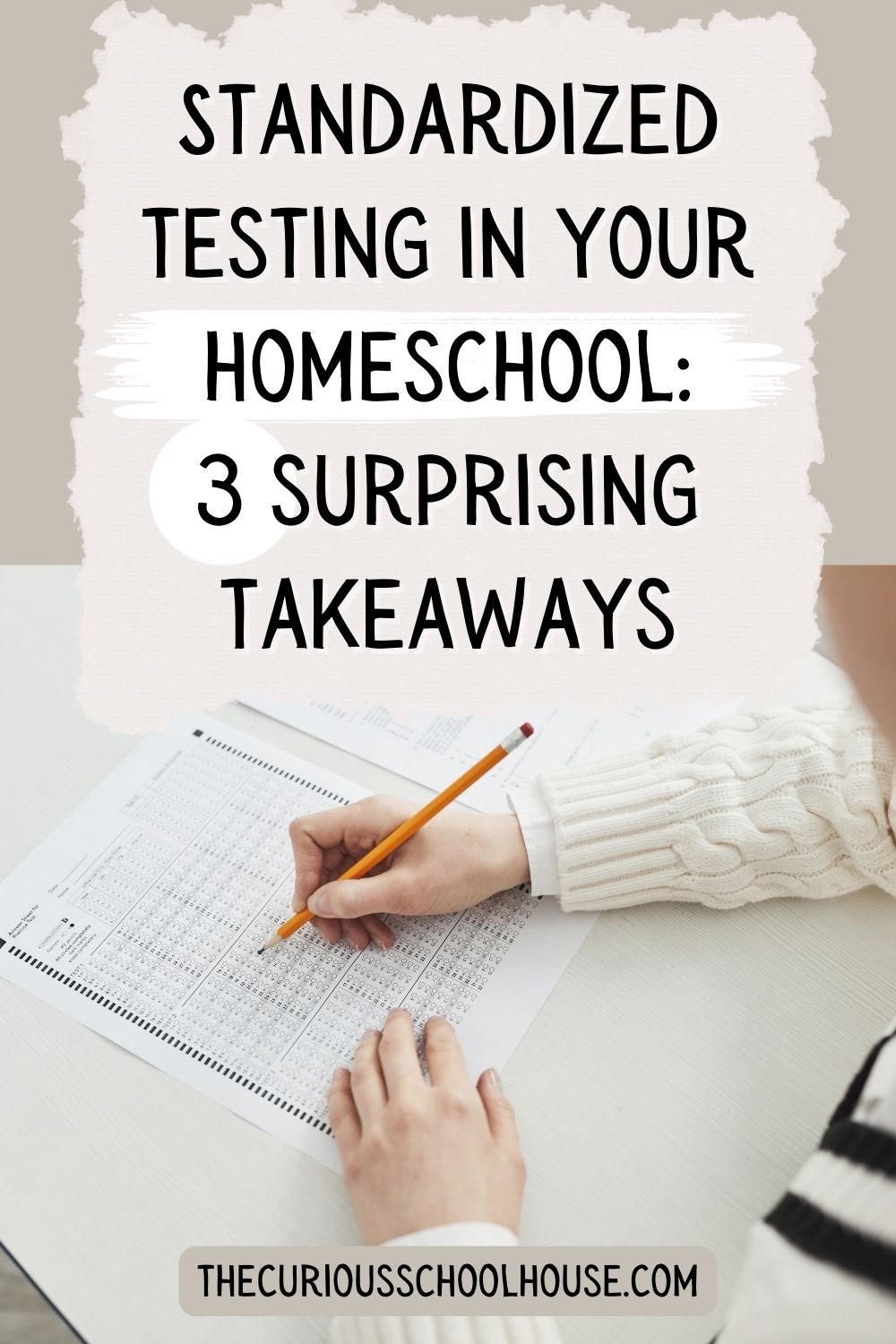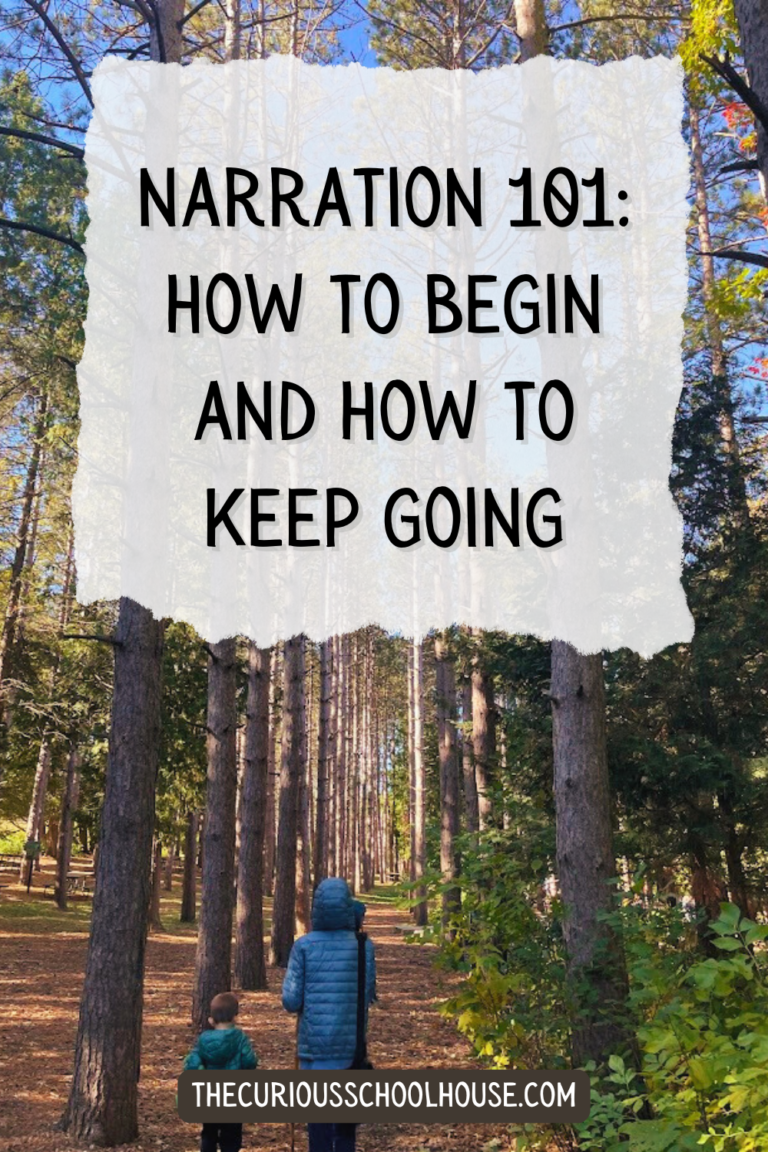Standardized Testing in Your Homeschool: 3 Surprising Takeaways
This post shares 3 lessons learned from our experience testing, pros and cons to standardized testing in your homeschool, as well as encouragement for homeschool moms that yes, homeschooling works!
My four oldest children recently finished taking two sets of standardized tests – a math test and a reading test. I got the results the day after they finished, and could not stop thinking about them. In this post, I’d like to share with you some of the lessons learned from this testing experience, encouragement for you that yes, homeschooling works, and also some of the actual test results themselves.
Now, you might be wondering why we are doing standardized testing in the first place, which is a very good question. As a general rule, we do not use tests or grades in our homeschool, and I’ve written an entire post on reasons to homeschool without tests.
However, we are part of a virtual school program this year which provides resources for homeschoolers, but one of the requirements is standardized testing in math and reading three times a year. I don’t like it and I feel like it’s generally a waste of my children’s time, but I will do it in order to comply with the requirements for the program.
My biggest takeaway from this last round of testing was the following: no matter how your child does on standardized testing, whether their results are amazing or dreadful or somewhere in between, take it all with a grain of salt.
The results mean something, but it’s not everything, and it might not even be what you think.
3 Lessons Learned from Standardized Testing
Lesson #1: Know your students. Our eight-year-old son, who is in third grade this year according to conventional measures, was incredibly intimidated by the paragraph questions on the reading test. He was literally sliding off the couch, writhing and moaning because of the amount of text on the screen that he was supposed to read in order to answer the question at the bottom.
When there were vocabulary questions, or short fill-in-the-blank type questions, he was fine – he could read, understand, and answer them correctly. But something about these long-form paragraphs just overwhelmed his brain and he was convinced that he could not do it.
Because I don’t believe these tests are too important, I was not about to force him to read the paragraphs. I encouraged him not to worry about it, but to just pick any answer and go on to the next question. As a proficient master of the testing system myself, I know from experience that a large part of learning how to take tests is learning how to guess.
So he did! He hastily clicked on answers without reading a single word of the paragraph questions, which comprised about a third of the total test. The next day, I got the test results in my email – and he had scored in the 95th percentile on the reading portion. I could not stop laughing! Apparently he had many lucky guesses in there.
Now, because I know my student, I know that long paragraphs still intimidate him and he still needs a lot of daily practice in order to become more comfortable with reading on his own. We can take this knowledge and address it in our daily homeschool routine.
What scares me is the thought that a teacher in the classroom would see his high test score and assume that he knows the material and is ready to move on – when that is not the case! A high score doesn’t necessarily mean a child has truly learned anything, and a low score doesn’t necessarily mean they haven’t learned the material.
Take it from a straight-A+ student who excelled at cramming for tests, making good guesses, and then forgetting all the material 10 minutes after the test was done. Yes, that was me, and yes, I remember nothing from those tests.

Lesson #2: Taking tests is good practice for taking tests. And that’s about all that it is good for. You can take this in a positive or negative light – either, “This is useless and a waste of time that could be spent actually learning something!” or “My kids will probably need this skill in the future, so we can use this as a lesson on ‘how to take tests.'” I am choosing the latter.
Like it or not, the ability to take (and pass) tests can open many doors in our society, and I want my children to know how to do that. As another example, our 10-year-old’s reading test results put him in the 70th percentile for his grade. Depending on how you look at it, this might not be that bad, but I noticed that it showed his current reading level as being lower than that of our 8-year-old – which I know is not true, because I see and hear them both read every single day.
What happened here was that Mr. Ten-Year-Old, as is fitting with his own particular personality, flew through the test, probably didn’t read the questions carefully, and so ended up with a “bad” score. I don’t see this as a critique on his reading level (because I already know what that is) so much as a reminder to me that he needs to learn how to take a test. Next time this testing comes around, I’ll need to prep him by telling him it’s important to read and re-read the questions, take your time, and think carefully about whether or not the answer you chose makes sense.
This particular test doesn’t tell me if he knows how to read, but it does tell me if he knows how to take a test.

Lesson #3: Homeschooling works. Obviously, there are as many different ways to homeschool as there are to be a parent, and no, it probably won’t work if you do nothing at all, neglect your children, and lie in bed all day eating chocolate truffles.
However – barring that extreme and unlikely circumstance – no matter what educational philosophy you might follow, it is a general truism that homeschooling works.
Because I had the great gift of being homeschooled myself, and growing up around homeschoolers, I have never doubted this fact! Those of us homeschooling in 2025 are late enough to the homeschooling game that we have plenty of examples of successful homeschoolers who have graduated, attended college, gotten married, and even decided to homeschool their own children.
By this point, after decades of homeschooling, if it didn’t work, people would not be doing it. I am convinced that 99.99% of all parents want what is best for their children, and if they saw, over and over again, that homeschooling produced ignorant, incompetent social misfits, it would die out and become a relic of the past.
Instead, more families are choosing to homeschool today than ever before.
However, back to standardized testing – despite having zero test-taking experience, none of my children failed the tests utterly. We did not find any huge, unrepairable gaps in their education.
My 6th grader has never once done a literature curriculum, a vocabulary curriculum, OR a language arts curriculum, yet he scored in the 93rd percentile on his reading test and was told that he should be reading books at the 9th grade level (to be clear, his test results were significantly more accurate than Mr. Eight-Year-Old’s – he wasn’t writhing on the couch, but instead actually read all the paragraphs and attempted to answer correctly).
Our little kindergartner, who has never done even one page of a formal math curriculum (we plan to start next year), scored in the 90th percentile on math – telling me that she is right on track with her peers who are also in the middle of their kindergarten year. Maybe, just maybe, kindergartners don’t need curriculum!
What a novel thought.
Now, lest you sniff out an apparent contradiction here, let me forestall you by addressing it directly: “Emily, aren’t you saying on the one hand that these tests are not accurate gauges of learning, and then on the other hand using the test results to prove that your children are successful?”
Sort of, but not really.
I maintain that test results are not highly accurate (if you want a better measure of what your child has learned and retained, give narration a try) – and yet they are mildly accurate. If my children scored below the 20th percentile on one of these tests, then yes, I would look into what exactly we are missing and decide if we need to make an adjustment. We didn’t see any major red flags from our results.
And yet on the other hand, I would not take any single test result as the One and Only Measure Of Whether Our Homeschool Is Working or Not. In my head I imagine having a giant tally board with one side labeled “Homeschool Success” and the other labeled “Homeschool Failure.” There are hundreds of little moments throughout the days and weeks that fall into one side or the other; and these positive test results are one more small tally on the side of “homeschool success.”
There are other, more important tallies as well – but a generally favorable testing experience adds another little vote in that direction.
Conclusion: Take Your Tests With a Grain of Salt
We don’t do a lot in our simple, ordinary homeschool. I do my best to be faithful – to keep plugging away, as much as we are able – but there are still plenty of things we do not do, and I would bet the same is true of you! My encouragement here to you is that that is enough.
Showing up for our kids each day, doing the work in front of us to the best of our ability with the strength God provides, reading to them, sharing our lives with them and most of all, loving them – that is enough!
I did not need a set of standardized tests to tell me that my kids were learning, and not all the tests were accurate reflections of what my children do and do not know.
If you simply pay attention in your home, talk with your children, and listen to what they say, you will know if they are learning!
There is nothing wrong with choosing to (or needing to) do standardized testing in your homeschool, but please don’t view the results as a God-inspired verdict on your children OR on your parenting. I don’t mean to say that you should ignore the results completely – you may find something helpful that you can use in moving forward – but our time is better spent in observing and talking with our children rather than over-analyzing a test result.
There’s also the much larger issue of viewing testing – or a passing grade – as the end goal of education; which is a poor substitute for a true love of learning.
Take your tests, if you must, glance at the results, but then let us move on to bigger and better aims: real, self-motivated learning that is marked by wonder, delight, and curiosity.
“In the first place, people rarely accomplish beyond their own aims. Their aim is a pass, not knowledge: ‘they cram to pass and not to know; they do pass and they don’t know.'”
~ Charlotte Mason, Parents and Children







